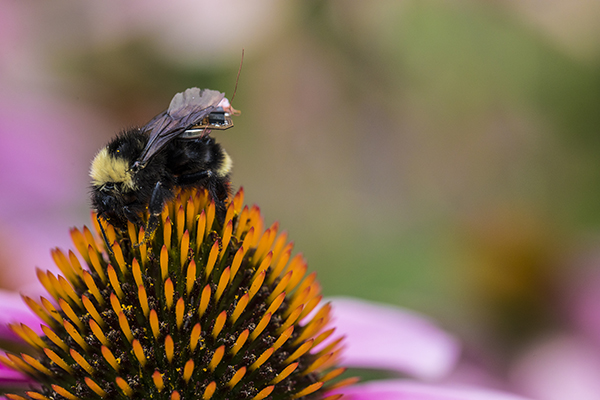Allen School professor Shyam Gollakota has received a 2021 Moore Inventor Fellowship in recognition of his work at the nexus of low-power wireless communication, biology and living organisms. Gollakota, who directs the Allen School’s Networks & Mobile Systems Lab, is the first University of Washington faculty member to receive this prestigious award that nurtures the next generation of scientist-inventors. The Gordon and Betty Moore Foundation established the fellowship program aimed at supporting “50 inventors to shape the next 50 years” in 2016 to mark the 50th anniversary of Moore’s Law positing the exponential growth in computer processing power.
Power figures prominently in Gollakota’s work — but in his case, the focus has been on finding ways to wirelessly fuel computation in order to cut the cord and lighten the load. Much like the results of the eponymous law articulated by Gordon Moore, Gollakota’s research has led to expanded computational capabilities accompanied by a shrinking form factor.
His first foray into wireless computing resulted in a breakthrough known as ambient backscatter. Together with his UW colleague Joshua Smith, who holds a joint appointment in the Allen School and the Department of Electrical & Computer Engineering, Gollakota developed a battery-free system that used television, WiFi and other wireless signals as both a power source and a mode of communication. In a series of subsequent projects, Gollakota and his collaborators expanded these capabilities to cover greater distances and bestow the capability to perform wireless computation on a greater variety of objects.
After looking skyward to enable devices to pull power out of thin air, Gollakota cast his eyes in the opposite direction as he contemplated how to make the most of these new capabilities.
“Outside there’s a whole world on every square foot, with living beings that you don’t even think about. We just walk over it,” Gollakota said in a UW News story. “But there’s so much happening — feats of engineering. There’s so much beauty in these tiny things.”
Gollakota and his colleagues drew inspiration from those “tiny things” to engineer a new line of research he has dubbed the Internet of Biological and Bio-Inspired Things. The concept began to take off with the development of a lightweight wireless sensor backpack small enough to be carried by bumblebees. The onboard sensors gather data about the surrounding environment as the bees go about their daily business; upon their return to the hive each evening, the data they logged is uploaded using backscatter while the tiny battery is wirelessly recharged for the next day’s flight. Gollakota and his collaborators followed up that buzz-worthy project with a wireless sensing package that could be safely air-dropped from great heights by live moths or drones into remote or impassable areas, followed by a miniature remote-control camera that can ride on the back of a beetle. Looking to the future, Gollakota is keen to explore ways to more deeply integrate biology and technology to achieve his vision.
“Simply put, Shyam is amazing — he is easily the most creative person I have ever met,” his Allen School colleague Thomas Anderson observed earlier this year. “He repeatedly invents and builds prototypes that, before you see them demonstrated, you would have thought impossible.”
While Gollakota’s notion of an Internet of Biological and Bio-Inspired Things may at first seem to belong in the realm of science fiction, it has many practical applications, from wildlife conservation, to smart agriculture, to large-scale environmental monitoring. In parallel with this work, Gollakota has also collaborated with colleagues and clinicians on a series of mobile sensing projects to support contactless disease detection and health monitoring using smartphones and smart speakers.
Gollakota is one of five innovators to be named in the 2021 cohort of Moore Inventor Fellows. He and his fellow honorees were selected from nearly 200 nominations received by the Foundation and will each receive $825,000 to further their inventions. Gollakota, who holds the Torode Family Career Development Professorship in the Allen School, previously earned the Association for Computing Machinery’s ACM Grace Murray Hopper Award in recognition of his early-career technical contributions, MIT Technology Review’s TR35 Award recognizing the world’s top innovators under the age of 35, and a Sloan Research Fellowship — among many other honors since his arrival at the UW in 2012.
Read the Moore Foundation announcement here, Gollakota’s Moore Inventor Fellow profile here, and a related UW News story here.
Congratulations, Shyam!



